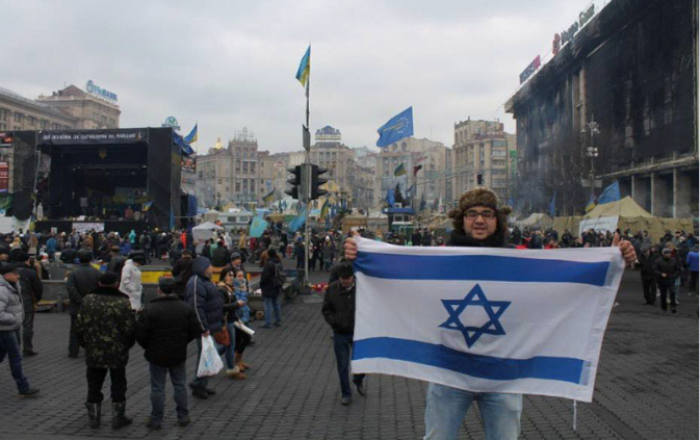Nash Holos: False accusations of antisemitism in Ukraine
Volodymyr Valkov, of the Jewish Heritage Museum in Ukraine, discusses charges of antisemitism in response to a New Year’s skit on the Maidan in which Jewish persons were depicted in a derogatory manner.
The pro-European protests in Ukraine that started on November 21 of last year have attracted international attention. The massive protests are seen as a sign of a growing civil society and democratic aspirations of the Ukrainian people.
But some observers worry about the increasing popularity of the nationalist political party Svoboda, and antisemitic statements by radical members of the party. Does this mean that Antisemitism is on the rise in Ukraine?
This is an important issue to consider.
Ukraine once had a thriving and prosperous Jewish community, and for centuries it was an integral part of Ukrainian society.
For most of recorded history, Jews have been the largest national minority on the territory of modern-day Ukraine. In 1765, the Jewish population numbered 300,000. By 1941, it had grown to 2,700,000.
But within a few years, the Nazi Holocaust nearly wiped out Ukraine’s Jewish population. It also decimated a substantial percentage of Ukrainians and other Slavs inhabiting this resource-rich territory.
By 1959, the Jewish population in Ukraine was just 840,000.
After the World War Two, the Soviet regime resumed the ‘spiritual Holocaust’ it had begun in the wake of the First World War … carrying out religious and cultural oppression to destroy what was left of Ukraine’s Jewish community.
The population continued to drop, due to a negative birthrate and emigration to Israel and the west. In 1989, on the eve of Ukraine’s independence, Ukraine’s Jews numbered about 488,000. And by 2012, just over 103,000.
In a few decades, the Nazis and Soviets between them destroyed a cultural heritage dating back to the Kievan Rus’ era. During the rule of the 11th century monarch Yaroslav the Wise, one of Kyiv’s city gates was called Judaic.
The 20th century destruction of human resources was accompanied by massive destruction of property – places of worship, commerce, and culture.
In addition to the physical and spiritual destruction, the two totalitarian regimes, and their legacies, have severely damaged relations between the Ukrainian and Jewish peoples. Their tools are sophisticated and sly … national and international propaganda, orchestrated provocations such as those still carried out on Euromaidan today, and media manipulation by carefully disguised political provocateurs.
Upon Ukraine’s independence in 1991, efforts at reconciliation began … spearheaded by non-profit organizations both inside and outside Ukraine. One of the most prominent is the Ukrainian Jewish Encounter based in Toronto, Canada, which is the sponsor of this Ukrainian Jewish Heritage radio series.
We simply cannot allow regretful episodes of calculated political discourse to set back the hard work and long-term efforts at Ukrainian-Jewish reconciliation. Because although much work remains, considerable progress has been made.
The Association of Jewish Organizations and Communities of Ukraine stated that “over the last four to five years, there has been a continuous decline in the number of antisemitic publications in the press; in the number of acts of vandalism of cemeteries, memorials, and synagogues; and in the number of assaults on the street of Jewish people” … as well as declining negative attitudes toward Jewish persons in public opinion polls.
While the Jewish population has its reservations about antisemitic politicians, Jewish community leaders understand the importance of fostering unity within civil society and the political opposition.
On December 1st, the day after the government’s violent crack down on peaceful protesters on Maidan in Kyiv, several influential Jewish organizations issued a press release condemning the brutality, and expressing support for the pro-democratic movement.
In light of this mutual goodwill, and the progress made towards reconciliation since Ukraine’s independence, do the ignorant and ill-advised comments of a few political extremists provide grounds to talk about increasing antisemitism in Ukraine today?
Ukrainian-Jewish relations are still in a fragile state. But the strengthening of democracy in Ukraine can help create renewed trust, mutual understanding, and an environment in which Antisemitism will continue to decline… in Ukraine and, we hope, around the world.
Listen to the program here.
Ukrainian Jewish Heritage is brought to you by the Ukrainian Jewish Encounter (UJE), a privately funded multinational organization whose goal is to promote mutual understanding between Ukrainians and Jews. Transcripts and audio files of this and earlier broadcasts of Ukrainian Jewish Heritage are available at the UJE website and the Nash Holos website.




















